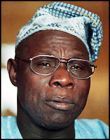African mediators look to Obasanjo to break Darfur talks deadlock
 ABUJA, Nigeria, Nov 6, 2004 (PANA) — African Union (AU) mediators at the Darfur peace talks in Abuja are pinning their hopes of breaking a deadlock at the talks on host President Olusegun Obasanjo [photo], after a series of consultations fails to advance the negotiations
ABUJA, Nigeria, Nov 6, 2004 (PANA) — African Union (AU) mediators at the Darfur peace talks in Abuja are pinning their hopes of breaking a deadlock at the talks on host President Olusegun Obasanjo [photo], after a series of consultations fails to advance the negotiations
Saturday.
The mediators battled in vain all day Saturday to convince the Sudanese government to sign the two protocols on humanitarian and security issues agreed to by the parties, but separate consultations continued with the government and the two main rebels groups.
The Sudanese government had refused to sign the protocol Friday because of the “no-fly zone” provision, aimed at ending bombing raids by government planes on rebel territory, asking for more time to consult on the issue.
The government delegation, led by Agriculture Minister Magzoob Al-Khalifa, argued that the provision would make it impossible for the government to maintain security in the western region.
The rebel groups had reversed their earlier contention and
gleefully announced they would sign the agreement.
AU spokesman Niang Boubou told PANA in Abuja Saturday
consultations also continued on the Declaration of Principles
(DOP), spelling out grounds for future engagements at the talks.
“We are trying to get the Sudanese government to agree to sign
the documents, this is the expectations of most people, we want
to get the documents signed so that we move to the next stage,”
he said.
He did not say categorically when the signing ceremony would take
place, but noted: “I am hopeful that it would be soon because
President Obasanjo is (working) on it.”
“You know that the government of Sudan asked for some time to
sort out some clarifications on the security protocol, I presume
that they would soon conclude whatever consultations they are
holding on it,” Boubou said.
If the agreement had been sign as expected Friday, the second
round of the AU-sponsored talks would have ended ahead of its
three-week duration.
Other areas of disagreement include the cantonment of rebel
fighters and the pro-government Janjaweed militia, blamed for
most of the atrocities in Darfur.
According to UN figures, 20 months of fighting between government
forces and the rebel groups – Sudan Liberation Army (SLA) and
Justice and Equality Movement (JEM) – have forced 1.6 million
people out of their homes and killed 70,000.
The Khartoum government disputes the figures.
